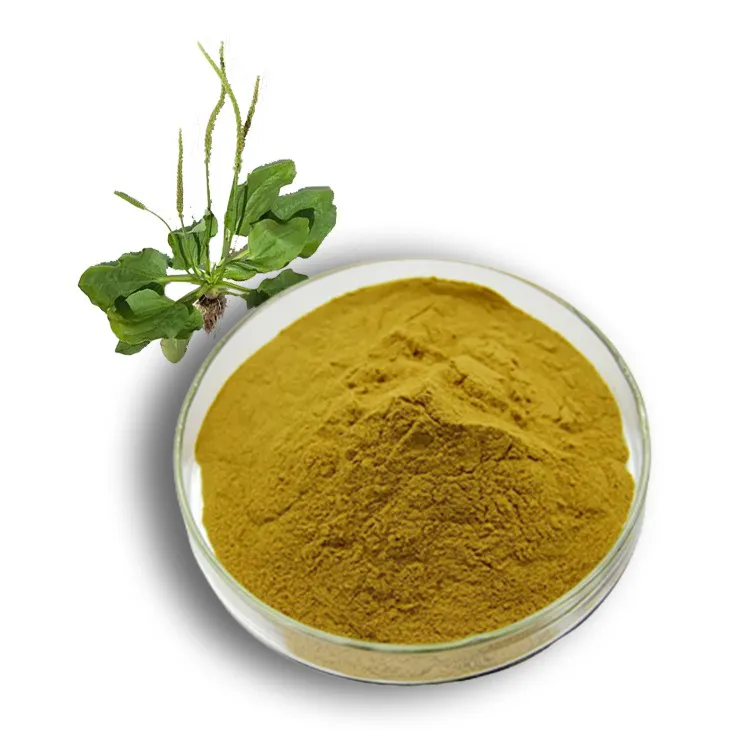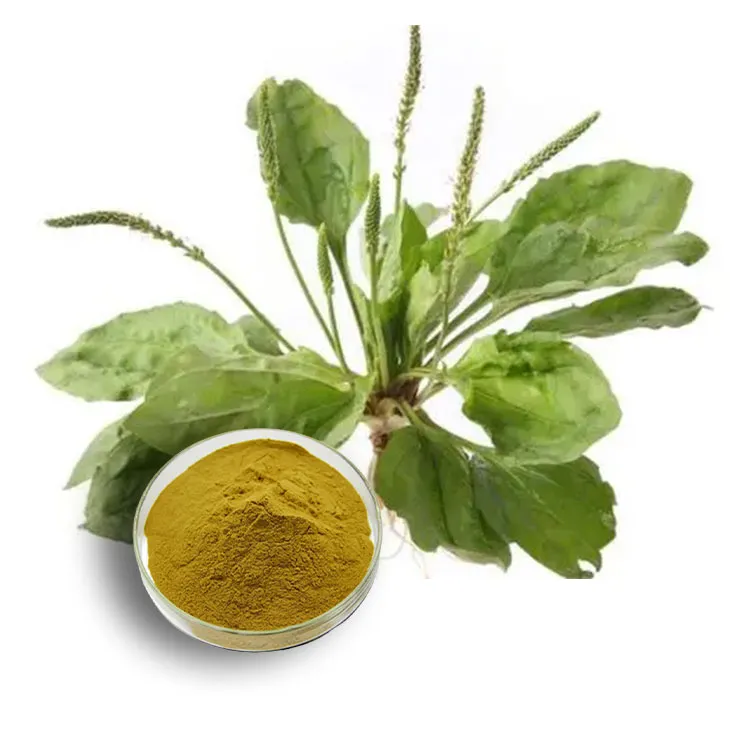- 0086-571-85302990
- sales@greenskybio.com
Use plantain extract to prevent diseases and enhance immunity.
2024-11-13

1. Introduction
In modern society, there is an increasing interest in natural remedies for disease prevention and immunity enhancement. Among various natural substances, Plantago asiatica extract has attracted much attention. This extract has a long history of traditional use and is also being studied extensively in modern scientific research for its potential health - promoting properties.

2. Traditional Uses of Plantago asiatica
2.1 In Traditional Chinese Medicine
In traditional Chinese medicine (TCM), Plantago asiatica has been used for centuries. It is considered to have properties such as clearing heat, promoting diuresis, and relieving stranguria. TCM practitioners often use it to treat urinary tract infections, inflammation of the eyes, and some digestive problems. For example, in cases of urinary tract infections, the diuretic effect of Plantago asiatica is thought to help flush out bacteria from the urinary system.2.2 In Other Traditional Medicines
In some other traditional medicine systems around the world, Plantago asiatica also has its place. For instance, in certain Asian and European folk medicines, it has been used topically to treat skin wounds and inflammations. The leaves of Plantago asiatica are sometimes mashed and applied directly to the affected area of the skin to promote healing.
3. Scientific Research on Plantago asiatica Extract
3.1 Chemical Composition
Plantago asiatica extract contains a variety of bioactive compounds. These include polysaccharides, flavonoids, phenolic acids, and iridoid glycosides. Polysaccharides are known for their immunomodulatory effects. They can stimulate the immune system by interacting with immune cells such as macrophages and lymphocytes. Flavonoids have antioxidant properties, which can protect the body from oxidative stress caused by free radicals. Free radicals are unstable molecules that can damage cells and DNA, and are associated with various diseases including cancer and cardiovascular diseases.3.2 Anti - inflammatory Effects
Studies have shown that Plantago asiatica extract has significant anti - inflammatory effects. Inflammation is a natural response of the body to injury or infection, but chronic inflammation can lead to many diseases. The anti - inflammatory mechanisms of the extract may be related to its ability to inhibit the production of pro - inflammatory cytokines such as interleukin - 1β (IL - 1β) and tumor necrosis factor - α (TNF - α). By reducing inflammation, the extract may help prevent diseases such as arthritis, inflammatory bowel disease, and some skin disorders.3.3 Antimicrobial Properties
The extract of Plantago asiatica also exhibits antimicrobial properties. It has been shown to have inhibitory effects on various bacteria, fungi, and viruses. For example, in vitro studies have demonstrated its ability to inhibit the growth of Escherichia coli, Staphylococcus aureus, and Candida albicans. The antimicrobial activity may be due to the presence of certain bioactive compounds in the extract, which can disrupt the cell membranes or metabolic processes of microorganisms. This antimicrobial property can be beneficial for preventing infections and maintaining the balance of the body's microflora.3.4 Immunomodulatory Effects
One of the most important aspects of Plantago asiatica extract is its immunomodulatory effects. It can regulate the immune system in different ways. For instance, it can enhance the activity of natural killer (NK) cells, which are an important part of the innate immune system and are responsible for recognizing and killing virus - infected cells and tumor cells. Additionally, the extract can also modulate the function of T - lymphocytes, which play a crucial role in adaptive immunity. By improving the immune system's function, the extract can help the body better resist diseases.
4. Impact on Different Body Functions
4.1 Urinary System
As mentioned earlier, Plantago asiatica has a long - standing reputation for its benefits to the urinary system. The extract can increase urine output, which helps in flushing out toxins and waste products from the body. This can be beneficial for preventing urinary tract stones and infections. Moreover, it may also have a role in protecting the kidneys from damage by reducing oxidative stress and inflammation in the renal tissue.4.2 Digestive System
In the digestive system, Plantago asiatica extract can promote the secretion of digestive juices, which aids in better digestion and absorption of nutrients. It may also have a prebiotic effect, promoting the growth of beneficial gut bacteria. A healthy gut microbiota is essential for overall health, as it is involved in immune function, digestion, and even mental health. Additionally, the anti - inflammatory properties of the extract can help soothe the digestive tract in cases of inflammation such as gastritis or colitis.4.3 Respiratory System
The extract has potential benefits for the respiratory system as well. It may help relieve coughs and reduce inflammation in the airways. Some studies suggest that it can inhibit the growth of respiratory pathogens, which can be useful in preventing respiratory infections such as the common cold and bronchitis.5. How to Use Plantago asiatica Extract
5.1 Dietary Supplements
One common way to consume Plantago asiatica extract is through dietary supplements. These are available in various forms such as capsules, tablets, and powders. When choosing a dietary supplement, it is important to ensure that it is from a reliable source and contains a standardized amount of the extract. However, it is always advisable to consult a healthcare professional before starting any new supplement, especially for those with underlying health conditions or taking medications.5.2 Herbal Teas
Another popular way is to make herbal teas using Plantago asiatica. The dried leaves can be steeped in hot water for a few minutes to make a tea. This tea can be consumed regularly for its potential health benefits. However, it should be noted that excessive consumption of herbal teas may cause some side effects, such as gastrointestinal discomfort.6. Safety Considerations
While Plantago asiatica extract has many potential health benefits, there are also some safety considerations.
- Allergic Reactions: Some individuals may be allergic to Plantago asiatica. Symptoms of allergic reactions may include skin rashes, itching, and swelling. If any allergic symptoms occur after using products containing the extract, use should be discontinued immediately.
- Drug Interactions: There may be potential drug interactions. For example, if a person is taking medications for blood thinning, the use of Plantago asiatica extract may increase the risk of bleeding. Therefore, it is crucial to inform healthcare providers about any use of herbal products, including Plantago asiatica extract, when taking medications.
- Overdose: Excessive use of Plantago asiatica extract may lead to adverse effects such as nausea, vomiting, and diarrhea. It is important to follow the recommended dosage guidelines when using products containing the extract.
7. Conclusion
Plantago asiatica extract shows great promise in preventing diseases and enhancing immunity. Its traditional uses, combined with scientific research on its chemical composition, anti - inflammatory, antimicrobial, and immunomodulatory effects, suggest that it can play an important role in maintaining health. However, it is essential to use it safely and under the guidance of healthcare professionals. With further research, the full potential of Plantago asiatica extract in promoting human health may be more fully realized.
FAQ:
Question 1: What are the main components in Plantago asiatica extract that contribute to disease prevention and immunity enhancement?
Plantago asiatica extract contains various bioactive components. Some of the important ones include polysaccharides, flavonoids, and phenolic acids. Polysaccharides are known to have immunomodulatory effects, which can enhance the body's immune response. Flavonoids possess antioxidant properties that help protect cells from damage by free radicals, reducing the risk of certain diseases. Phenolic acids also contribute to the overall antioxidant activity and may have anti - inflammatory effects, which are beneficial for preventing diseases and maintaining a healthy immune system.
Question 2: How does Plantago asiatica extract enhance the immune system?
The extract can enhance the immune system through multiple mechanisms. Firstly, as mentioned before, the polysaccharides in it can stimulate the immune cells such as macrophages and lymphocytes, making them more active in recognizing and eliminating pathogens. Secondly, its antioxidant properties help in reducing oxidative stress in the body. High levels of oxidative stress can suppress the immune system, so by reducing it, the immune function can be improved. Additionally, some components in the extract may have a regulatory effect on the immune signaling pathways, ensuring a proper and balanced immune response.
Question 3: Are there any traditional uses of Plantago asiatica related to disease prevention?
Yes, in traditional medicine, Plantago asiatica has been used for various purposes related to health maintenance. It has been used to treat respiratory infections, digestive problems, and urinary tract disorders. For example, in some traditional herbal remedies, it was used to soothe coughs and reduce inflammation in the respiratory tract. These traditional uses suggest that it may have properties that are beneficial for preventing certain diseases, although modern scientific research is still needed to fully understand the mechanisms behind these effects.
Question 4: Can Plantago asiatica extract prevent specific diseases?
There is evidence to suggest that it may help prevent certain diseases. For instance, due to its antioxidant and anti - inflammatory properties, it may play a role in preventing cardiovascular diseases. By reducing oxidative stress and inflammation in blood vessels, it can potentially lower the risk of plaque formation and other vascular problems. It may also have a preventive effect on some types of cancers. The antioxidant components can prevent DNA damage caused by free radicals, which is an important factor in cancer development. However, more research is required to establish conclusive evidence for its disease - specific preventive effects.
Question 5: Is there any side effect of using Plantago asiatica extract for disease prevention and immunity enhancement?
While Plantago asiatica is generally considered safe, in some cases, there may be potential side effects. Some people may experience allergic reactions to the extract, especially those with pre - existing allergies to plants in the Plantaginaceae family. Also, if consumed in excessive amounts, it may cause digestive discomfort such as diarrhea or abdominal pain. It is important to use it under proper guidance and in moderation, especially when considering long - term use for disease prevention and immunity enhancement.
Related literature
- The Bioactive Components of Plantago asiatica and Their Health - Promoting Effects"
- "Plantago asiatica in Traditional Medicine: A Review of its Therapeutic Applications"
- "Antioxidant and Immunomodulatory Properties of Plantago asiatica Extract: Current Research and Future Perspectives"
- ▶ Hesperidin
- ▶ citrus bioflavonoids
- ▶ plant extract
- ▶ lycopene
- ▶ Diosmin
- ▶ Grape seed extract
- ▶ Sea buckthorn Juice Powder
- ▶ Beetroot powder
- ▶ Hops Extract
- ▶ Artichoke Extract
- ▶ Reishi mushroom extract
- ▶ Astaxanthin
- ▶ Green Tea Extract
- ▶ Curcumin Extract
- ▶ Horse Chestnut Extract
- ▶ Other Problems
- ▶ Boswellia Serrata Extract
- ▶ Resveratrol Extract
- ▶ Marigold Extract
- ▶ Grape Leaf Extract
- ▶ blog3
- ▶ blog4
- ▶ blog5
-
Organic Tongkat Ali extract powder factory.
2024-11-13
-
How to make powder with ashwagandha extract.
2024-11-13
-
Rosehip extract manufacturers from China.
2024-11-13
-
The best cat's claw extract in nature.
2024-11-13
-
Chinese Dandelion Leaf Extract Suppliers.
2024-11-13
-
Rosemary extract
2024-11-13
-
Bitter Melon Extract
2024-11-13
-
Dandelion Leaf Extract
2024-11-13
-
White mustard seed extract
2024-11-13
-
Citrus Aurantii Extract
2024-11-13
-
Quercetin
2024-11-13
-
Beta Carotene
2024-11-13
-
Echinacea Extract
2024-11-13
-
Medicinal Marshmallow Extract
2024-11-13
-
Saponin Extract
2024-11-13





















